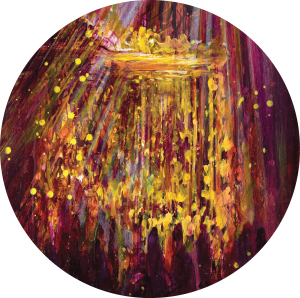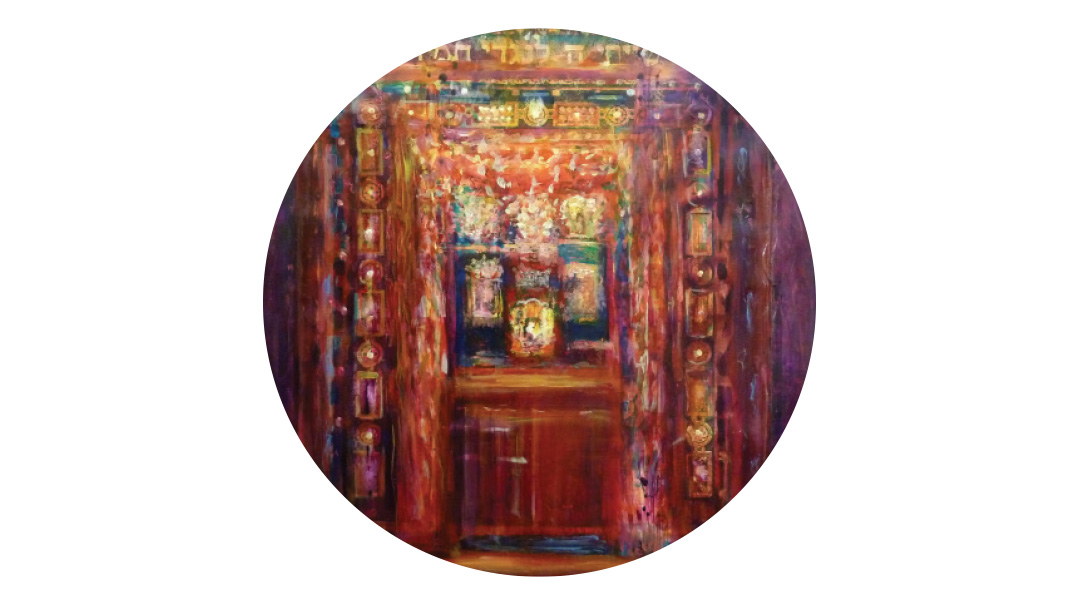The View from the Mountain

We gain comfort when we realize His presence never left us

A name encompasses the essence of an entity or person.
Shabbos Nachamu, named for the first words of the haftarah, “Nachamu, nachamu, ami,” is a Shabbos during which we’re offered comfort after the intense three-week period of mourning.
The question is obvious. Nothing’s really changed. The Beis Hamikdash is still not built, and we’re still in exile. What comfort is there?
Rav Eliyahu Schlesinger, in his sefer Eileh Heim Moadai, suggests the nechamah stems from the message in the beginning of parshas Va’eschanan. Moshe Rabbeinu davens 515 tefillos as he pleads to be allowed to enter Eretz Yisrael. Hashem has to tell him to stop praying, because one more tefillah and indeed, He would’ve nullified the decree. This provides us with the paradigm of tefillah in any time of challenge and difficulty, and assures us that Hashem is close, and responsive when we call out to Him.
Although it’s true that the Beis Hamikdash has been destroyed, and we’re no longer able to bring sacrifices, we have the medium of tefillah through which to connect to Hashem. And it’s via that conduit that we’re ultimately able to bring the Geulah. When we’re buoyed by this powerful idea, we begin to feel comforted, knowing that we have the ability to change the current difficult situation.
All Good
Rav Schlesinger offers another aspect of comfort that we can derive from the haftarah itself. Yeshayahu Hanavi says (40:9), “Ascend upon a high mountain, O herald unto Tzion. Raise your voice in strength… Say to the cities of Yehudah, ‘Behold, your G-d.’”
To feel comfort, one needs to climb a mountain. One must be able to look at a situation from a longer-term perspective. When we view the challenges we face as individuals or as a community, we get caught up in the moment, in the vicissitudes of life that completely overtake us.
But from a perch at the top of the mountain, one is able to see new horizons, and it infuses a person with newfound hope. It’s then that we’re able to feel our close relationship with Hashem, an intimate connection that can never be severed.
In the pasuk “Nachamu, nachamu, ami, yomar Elokeichem,” the term used for Hashem reflects the attribute of judgment, not mercy. Rabbi Moshe Reiss, in Paamei Moed, cites the idea that the way Hashem comforts us is by showing us even strict justice is for our benefit. In reality, everything is only good, there’s never anything bad.
Once, a Holocaust survivor was a guest at the table of the Imrei Emes of Gur. The Rebbe questioned why the breaking of the Luchos was done in front of the people’s eyes. Why was that important? He compares this to another pasuk (Bereishis 42:24) that also emphasizes the same concept: “He took Shimon from them, and imprisoned him before their eyes.”
Rashi notes that Yosef imprisoned Shimon only while the other brothers were there; once they left, he released him, gave him food, and treated him well. Likewise, said the Imrei Emes, it appeared to the people that the Luchos were broken, while in reality, they were still very much intact. Hence these Luchos were kept in the aron, and one day we’ll merit to see them in their complete state. Because what we see as destruction and devastation is only an illusion. In reality, there’s no brokenness, only wholeness.
The Chida, in the sefer Amudeha Shivah (23a), explains that Hashem sent angels to bring debris and ashes from another location to Har Habayis so that it appeared that the Beis Hamikdash was destroyed, while in reality, it was buried in the ground.
Hashem’s presence has never left Har Habayis; we’re just temporarily unable to see the building it was housed in. This is the deeper meaning of the pasuk at the end of Eichah (5:17) “For this our heart was faint, for these our eyes were dimmed.” It’s only from our perspective that the Beis Hamikdash isn’t visible. In the future, Hashem won’t build a new building, rather, He will return the original one.
Only an Illusion
This idea allows us to understand the pasuk in Tehillim 126:1: “When Hashem will return the captives of Tzion, we’ll be like dreamers.” The whole period of exile and destruction will be like a dream, an illusion. The original captives of Tzion will be returned to their homeland and their original wholeness. The ultimate comfort is our realization that what we perceive as bad is an illusion, only bad because of our limited perception.
Rabbi Binaymin Eisenberger, in Mesillos Bilvavam, suggests that Shabbos itself is the comfort. He quotes Rav Hutner, in Pachad Yitzchak, who notes that the Shir shel Yom of Shabbos, Tehillim 92, is one of the few chapters whose opening line, “Mizmor shir l’yom haShabbos,” has no connection to the rest of the chapter. The rest of the perek deals with Hashem’s justice system in This World.
Rav Hutner explains that the Chumash tells us Hashem saw all He created was good, and then rested and sanctified the Seventh Day. Likewise, we celebrate Shabbos with the understanding that everything Hashem does in This World is good. Therefore, the second pasuk in perek 92 states, “It’s good to thank Hashem…” The whole chapter continues with this theme of goodness, wherein Hashem punishes the wicked and the righteous flourish.
Shabbos Chazon, the Shabbos before Tishah B’Av, focuses on Hashem’s love for us, although He sent us into exile. On Shabbos Nachamu, we have the opportunity to reciprocate this love through our recognition of His goodness. This Shabbos is the greatest time to access comfort from Above. It’s a time of tremendous closeness and love, a time to realize that all that Hashem does is good, and be strengthened and comforted by this knowledge.
The Jewish calendar year is meant to be dynamic. We’re encouraged to enter into the emotional experience of the time and become changed as a result. Shabbos Nachamu is an opportunity for us to fortify ourselves in the power of our tefillos, an opportunity to feel more connected when we daven. It’s a time to “climb the mountain” and try to gain a larger perspective of all that we experience and not get caught in the “here and now” mentality. It’s a time to realize that the Luchos and the Beis Hamikdash were never really broken, and we’ll one day see their wholeness.
Ultimately, it’s a time to experience the beauty of Shabbos, singing to Hashem in recognition of all the goodness in This World. When we inculcate these messages, we’ll indeed feel the comfort that the Navi promises us.
(Originally featured in Family First, Issue 655)
Oops! We could not locate your form.







